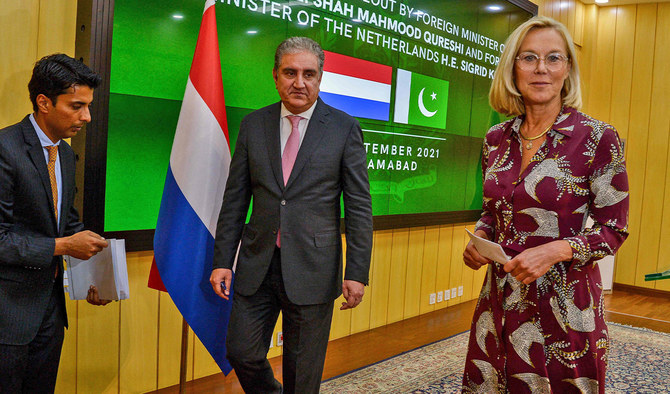ISLAMABAD: Dutch Foreign Minister Sigrid Kaag said on Wednesday her country would work closely with Pakistan on the issue of Afghan refugees, as she held talks with officials in Islamabad on the evolving situation in Afghanistan.
The Taliban took control of Afghanistan two weeks ago, as US-led forces were completing their withdrawal. Thousands of people have left Afghanistan since, and the United Nations has warned that up to half a million Afghans could flee their homeland by the end of the year.
Kaag's visit to Islamabad comes as Dutch Prime Minister Mark Rutte told the media on Tuesday the last thing his country wanted was “a repeat of what happened in 2015 and 2016 with the Syrian refugee crisis.” She is the first Dutch foreign minister visiting Pakistan in 15 years.
On Wednesday evening, Kaag held talks with Pakistani government representatives led Foreign Minister Shah Mahmood Qureshi.
"Looking towards the future, Minister Qureshi and I have discussed closer cooperation on refugees," she said in a statement shared by the Dutch government's portal after the meeting. "On Friday, I will speak with other EU Member States about the importance of supporting the region in dealing with a possible refugee crisis."
"Pakistan and the Netherlands are in constant touch in the face of the changing situation in Afghanistan," Qureshi said, as quoted in a foreign office statement after the meeting with Kaag. "The Dutch Foreign Minister appreciated Pakistan's sheltering of millions of Afghan refugees for four decades."
As foreign donors have been alarmed about an impending humanitarian crisis in the war-devastated country, he called on the international community for more assistance to prevent an exodus from Afghanistan.
"The international community should step forward to provide financial assistance to Afghans, so they are not isolated," he said. "Leaving Afghanistan alone at this critical juncture can lead to security issues."
While Pakistan has been leading efforts to evacuate people from Afghanistan and has airlifted hundreds of foreign diplomats, including Dutch citizens, it has repeatedly said it would not take any refugees. There are currently 1.4 registered Afghan refugees in Pakistan, according to UN figures.
















